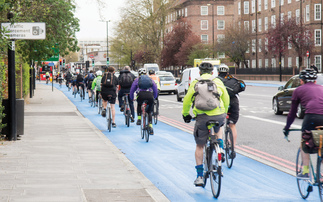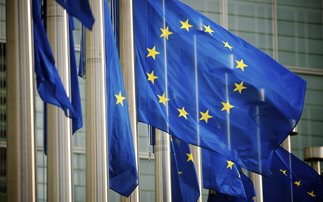With 151 days to go until a universal climate change deal, what should businesses be looking out for in the coming months
For the past five years, every time diplomats meet to negotiate a global climate change agreement, the reports that result appear to be stuck in some sort of United Nations Groundhog Day.
At times it has appeared that journalists could almost get away with rehashing old news stories from the last summit, repeating stock phrases about "painstakingly slow progress", rows between rich and poor countries, and NGOs warning of the fossil fuel lobby's malign influence on any future deal.
At the most recent meeting in Bonn, Germany last month, countries once again disappointed, when after two weeks talking they had succeeded in reducing the unwieldy 80-plus page text by just four pages.
We are 151 days away from the day when these years of glacial progress are supposed to culminate in a new international climate change deal, but in reality there are just 10 negotiating days left, with diplomats returning to Bonn in August and October for another two rounds of talks before the crucial Paris Summit.
Set against the experience of previous summits it is hard to see how an effective global deal to tackle climate change will be reached in Paris at the end of this year. The timeline is simply too tight and the progress to date too slow. The growing excitement and talk of momentum towards nearly 200 countries striking a meaningful agreement looks highly optimistic at best, naïve at worst.
But there is nevertheless a growing sense among diplomats, business leaders, and campaigners that a bold new deal can be struck. Crucially, rather than condemning the talks to several more months of stasis the Bonn meeting authorised the two co-chairs of the negotiations to go away and try and cut down the text further themselves. Instead of a trust-eroding attempt by a handful of countries to put together their own deal, as was alleged to have happened at the crucial Copenhagen Summit in 2009, this time a small group has been officially authorised to put together a workable text.
Meanwhile, if the text is as unwieldy as ever, this time it does sketch out a framework for an agreement that already has overwhelming support from all the key players. The proposal to move away from imposed national emissions targets to a system of nationally determined climate action plans, or INDCs in the jargon, has secured significant support from all the major economies and now a growing number of countries are putting forward their national emissions pledges under the new regime that they will commit to in the event of a deal.
Christiana Figueres, head of the UN's climate change secretariat, described the mood at the end of the last summit as "exceptional confidence and engagement" with every nation playing its part. Given the barely coded insults and threats that have marred previous summits this conciliatory atmosphere is extremely important and increases the chances of a deal being done.
In particular, Figueres noted that the Bonn talks delivered a surprise breakthrough on forest protection, with a package of three decisions expected to now be agreed in Paris on the policy to reduce emissions from deforestation and forest degradation (REDD+). The surprise agreement provided further evidence, alongside the new INDCs, that the basic framework for an agreement is taking shape.
But for the vast majority of businesses, the only question that matters is 'deal or no deal?'.
"The large majority of businesses are not looking to engage with the detail of Paris," says Eliot Whittington, director of the Prince of Wales's UK Corporate Leaders Group. "They're looking for Paris to deliver them a signal or a direction of travel that will then be reflected in national policies."
But he admits certain policies will prove more effective at providing that business and investment signal than others. To that end, all businesses and investors will be keen to see whether the treaty includes a long term goal to reduce emissions, regular five-year review periods to require countries to ratchet up their ambition to cut emissions, and clear transparency and rules about how the overall package of INDCs will work.
"For those who are just picking up the odd newspaper, then where you've got the negotiators going from [a negotiating text with] 89 pages to 85 pages - or whatever it was - after a week's work, that doesn't build confidence," Whittington counsels. "It doesn't give them a good signal."
For these mainstream businesses, a global climate deal will eventually have an impact on their business models and investment plans, but maybe not for a good few years. The significance of any Paris agreement and the detail that has to thrashed out over the coming months rests on the impact it will have on long term investment plans and operational risks.
But there is also a growing group of businesses more overtly committed to decarbonisation and greener operating models - businesses such as Unilever, BT, Sky, and other members of the Corporate Leaders Group - who are genuinely concerned about the details of any agreement. They want to know how ambitious the deal will be, whether it will deliver on the promise to limit global warming to 2C Celsius, if it will protect developing nations and vulnerable countries, how it will mobilise clean tech investment in industrialised and developing economies alike, and whether it will be legally binding.
Many of these companies are predicting, or already starting to see, how climate change affects their business, such as through droughts impacting harvests, or storms causing blackouts, and they want to ensure they are sustainable for the long run - both environmentally and financially.
"Obviously there is a significant group of companies worried about global warming over two degrees and they won't be happy with an unambitious agreement," adds Whittington.
These companies are already raising concerns that the pledges put forwards by countries through their INDCs will simply not deliver the emissions cuts required to decarbonise this century and prevent runaway climate change. Their fears appear to be well-founded.
Analysis by the International Energy Agency (IEA) released last month revealed countries' current pledges to cut greenhouse gas emissions through an international climate change deal still fall way short of the action required and will lead to average temperature rises of about 2.6C by 2100 and 3.5C after 2200.
It predicts that under current plans, the world is likely to exceed, by 2040, the carbon budget that scientists say is needed to give the world half a chance of meeting the 2C target. This would be just eight months later than would have occurred without the emissions reductions promised in the INDCs.
Stephanie Pfeifer, chief executive, of the Institutional Investors Group on Climate Change, which represents more than 100 European investors with assets worth a combined €10tr, underlines that any deal must therefore include a mechanism that will require countries to review and increase their carbon reduction targets every five years. "This will help identify where countries are falling short and ratchet up ambition to keep the world on a 2 degree pathway," she says.
Documents seen by Reuters last week show that the European Union is backing just such a plan - calling for a legally binding deal that will be enforced through five-yearly reviews, as oppose to once a decade as some other countries want.
If the talks appear to have delivered a degree of consensus on how the new agreement should be structured, it is here that dividing lines are likely to re-emerge (alongside the ongoing divisions around the perennially vexed topic of climate-related funding for developing nations). Will emerging superpowers such as China and India submit to having national emissions goals they spent many years resisting revisited in five short years? Will Republicans in the US Congress ever ratify a treaty that has a legal footing? It is a more encouraging argument to be having than the traditional row over whether emerging economies should accept any emissions targets, but it still has the potential to scupper any deal.









